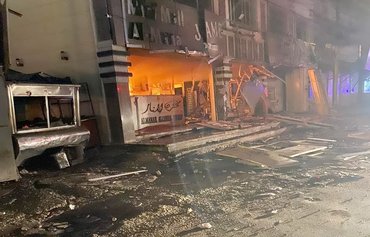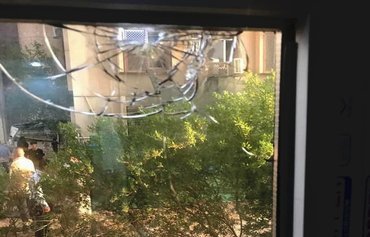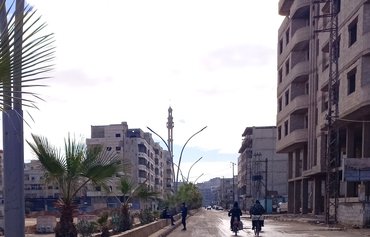Real estate prices in key Baghdad districts have dropped significantly over the past months as prospective buyers steer away from areas where Iran-backed militias have set up shop, local realtors told Diyaruna.
Property prices have fallen by more than 40% in residential districts such as Karrada, al-Jadriya, al-Arasat, Palestine Street and al-Salehiya, where there is an abundant supply and a decline in demand, the realtors said.
This can be at least partly attributed to the presence of militia headquarters in those areas, they said.
Iran-backed militias have set up about 30 positions in the area, including headquarters buildings, barracks and arms depots, said Ahmed Hussein, director of Ahd al-Ghadeer real estate company in Karrada.
Residents have been driven away by the militias' presence, he told Diyaruna.
Militiamen in vehicles without license plates fire weapons into the air, hold marches and rallies, arbitrarily block roads and otherwise disturb the peace, he said, noting their continued firing of Katyusha rockets towards the Green Zone.
"Any residential district that sees militias come in and open headquarters in it will see prices drop as residents start thinking about leaving," al-Ghadeer said.
House prices in Karrada used to average about 300 million Iraqi dinars ($250,000), and today average about 180 million dinars ($152,000) or less.
Rent prices have also dropped, and many shop owners no longer wish to stay.
Demographic change
Salam Jassim, a real estate appraiser with al-Rusafa Directorate of Taxation, told Diyaruna the militia headquarters are a "cancer for the real estate sector".
Key districts, where there was once a mix of Christians, Muslims, Arabs, Assyrians, Armenians and Kurds, have seen their demographic composition change as residents leave for safer areas, he told Diyaruna.
This has been the case in Karradat Mariam, al-Arasat, al-Alawiyya, al-Muntad Street, Abu Qallam and Karrada Dakhel, Jassim said.
The Iraqi government has taken steps to address the situation, such as requiring that militias obtain permission from security authorities to establish headquarters and prohibiting their establishment in residential districts, he said.
"But unfortunately there are already a large number of these headquarters that were established during the tenure of the previous prime minister, Adel Abdul-Mahdi," he said.
Hana Boutrous, news editor for a local TV station, told Diyaruna she put her apartment in Karrada on the market as her children are frightened by the Katyusha rockets the militias fire at the Green Zone and by their harassment.
But she would only have been able to sell it for half its value, she said, so she moved to the Yarmouk neighbourhood instead and rented a house there.
"This is safer," she said. "Going out in the morning and greeting a neighbour or a friend is better than going out and seeing faces covered with frightening black masks."
Attacking Iraq's security
Qusai Mallouki, who owns a shop in al-Jadiriya, told Diyaruna he has temporarily moved out of his house until his neighbourhood resumes its civilian character.
"Lebanese Hizbullah elements and even Iranians come to these headquarters," he told Diyaruna. "We have the right to live in comfort and without harassment."
The Katyusha rockets are the main source of fear as they challenge Iraq's law and order, he said, noting that "they are not attacking the US embassy as much as they are attacking the country's security and threatening Iraqis".
Most rockets fall on apartment buildings adjacent to the Green Zone, he noted.
Iraqi political expert Mohammed al-Tamimi told Diyaruna the events of this year have made it clear that the militias and the Iraqi people are on opposite sides of the political spectrum.
The militias have become alienated from society as they continue to assassinate public figures and activists, engage in the fighting in Syria, openly defy the Iraqi state and fire rockets under the orders of Iran, he told Diyaruna.
"Militiamen are no longer welcome," he said.
"People no longer desire to live in areas in which these militias have a presence, not only because they wish to live in peace and security, but also because they do not want to co-exist with them in any way," al-Tamimi said.

![An Iraqi man stands in front of security forces during a July 12th protest outside the Green Zone in Baghdad to demand a curb on paramilitary groups. [Ahmad al-Rubaye/AFP]](/cnmi_di/images/2020/07/22/25032-Iraq-Green-Zone-600_384.jpg)






